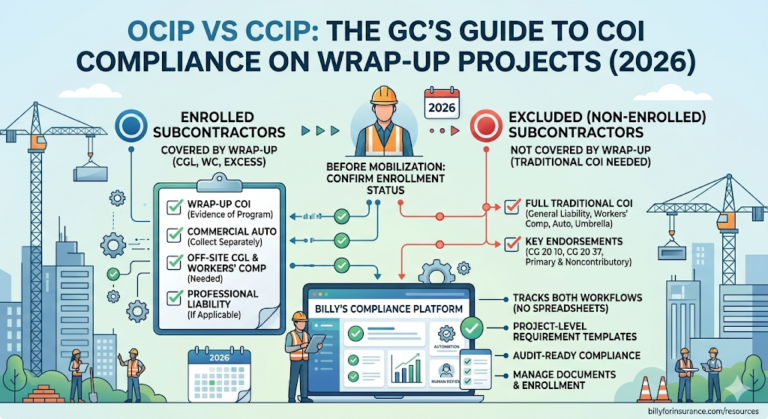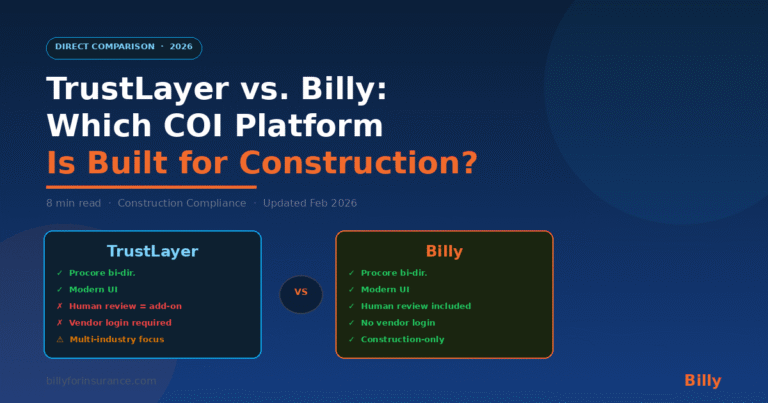The commercial construction industry has seen many advances in operating safe jobsites. New technology, safer equipment and updated training methods have made working on construction sites safer than ever before. Yet, despite these efforts and safety measures, construction workers still represented 20% of all workplace deaths in the U.S. in 2019 alone.
The nature of the construction industry includes inherent risks. Safety measures, training and technology can always be improved to mitigate these risks, but accidents can and likely will still happen.
The best way construction businesses can prepare for these unforeseen circumstances is by having adequate insurance plans in place. Proper construction insurance is essential for contractors and workers alike.
WHY CONSTRUCTION INSURANCE IS NECESSARY
A basic insurance policy covers the person or entity that purchased the policy. With construction insurance, that same policy should also protect the company that hired the person or entity. The subcontractor provides insurance to protect itself, but when it adds the general contractor’s name to the coverage, the coverage extends beyond the primary policyholder to protect the general contractor from liability.
When the general contractor is named on the construction insurance policy, the liability can’t be passed onto the general contractor from the subcontractor. So, the risk is mitigated. If the policy is inactive or doesn’t include the proper verbiage, however, then the construction liability lands on the general contractor, which now finds itself legally and financially responsible for accidents on the jobsite.
When it comes to understanding construction insurance and construction liability, it helps to think of it as structured the same way as a construction site. If the foundation of a project isn’t set up properly and it fails, everything above it pays the price and comes crashing to the ground. If a subcontractor or vendor has current insurance that’s valid and in place on a project when an accident involving the subcontractor occurs, the contractor pays the price by having its insurance cover the costs associated with that accident.
HOW TO CHOOSE THE RIGHT TYPES OF CONSTRUCTION INSURANCE
Equally important to maintaining a valid and active policy is choosing the right types of construction insurance. The most important types of construction insurance for contractors or construction companies include the following:
- Commercial Automobile Insurance: This protects contractors and workers who drive company-owned vehicles for business-related purposes. It can cover property damage claims and bodily injury claims as a result of accidents or other damages. This coverage is important because a personal car insurance policy won’t help cover third-party claims in an accident that someone might be involved in while operating a business-owned vehicle.
- Commercial General Liability Insurance: This provides coverage for claims that occur on the jobsite. Coverage includes bodily injury, personal injury, property damage and construction defects, which can extend up to 10 years after a project’s completion.
- Workers’ Compensation Insurance: If a worker gets sick or hurt because of their job, workers’ compensation insurance can help cover medical bills and replace most of the lost wages if they must miss work to recover. It also covers ongoing care, such as physical therapy and funeral costs if workers lose their lives due to work-related injuries or illnesses.
- Excess Liability Insurance: Excess liability insurance provides an extra cushion of protection on top of an existing policy for large or potentially catastrophic claims. It helps protect the future of a business by ensuring a single event or claim won’t bankrupt it. Excess liability insurance is extremely important in construction because most companies have several projects going on simultaneously. It prevents an incident on one project from taking down every other project—and the company—with it.
- Cyber Insurance: Cyber insurance is a relatively new addition to the list of important construction insurance policies, but it’s necessary in today’s world of costly cyberattacks. From 2019 to 2020, the number of cybercrimes increased by a massive 69%. And the average cost of a ransomware attack for a business in 2021 was $1.85 million. With so much data on many companies’ databases, it’s hard to secure everything all the time. Cyber insurance protects against data breaches that could lead to stolen company and worker data.
- Pollution Insurance: Another type of insurance that’s new but critical is pollution insurance. Depending on the project type and location, pollution insurance protects a contractor from pollution-related risks, ensuring accidents don’t turn into disasters for the business or its workers. It covers the company if the Environmental Protection Agency finds any violations regarding effluent and stormwater runoff, wetland management, solid and hazardous waste removal, spill reporting, and polychlorinated biphenyls (or PCBs) and asbestos usages. Fines from the EPA can be up to hundreds of thousands of dollars per day, meaning pollution insurance is necessary to help cover construction businesses financially.
HOW CONSTRUCTION BUSINESSES CAN GET ADEQUATE INSURANCE
Getting and maintaining the proper construction insurance coverage and construction liability protections has always been challenging for contractors and business owners. However, the challenges are often self-imposed: Most companies concentrate on the immediate needs of each specific task to keep forward progress on projects, forgetting that insurance is part of that progress.
By taking the following four actions, construction businesses can provide safety and support to their workers—and stop relying on hope as the only strategy for risk management:
- Understand policy requirements and coverage. Any construction business should first be aware of the construction insurance policies they already have and the requirements for using the benefits included. Any additional policies need to meet or exceed what is already present, thus providing fuller coverage.
- Emphasize the importance of construction insurance. Workers and contractors alike should have general knowledge of the insurance policies and tracking claims provided to them. A successful construction business will practice open communication regarding continual and comprehensive coverage. Workers also need to take ownership of the processes by getting involved in maintaining their coverage and filing claims.
- Renew policies early. For the best results, construction businesses should keep track of when all policies expire and add alerts 30 days before those dates to speak with providers about renewing. This is imperative because waiting two weeks before or, even worse, after it’s expired to renew a policy is generally too late.
- Get an automated system. Organization, tracking, communication, and processing can all be automated to reduce headaches and improve accuracy for a business. Most importantly, automated systems allow construction businesses to drastically reduce the risks associated with the job and insurance coverage.
Construction insurance is critical to running a safe and productive construction business. By understanding existing policies and their importance to workflows and safety, contractors and workers can stay safe while on the job. Additionally, renewing early and automating systems can remove the barriers to better, more effective construction insurance practices.
Originally published on Construction Executive.





